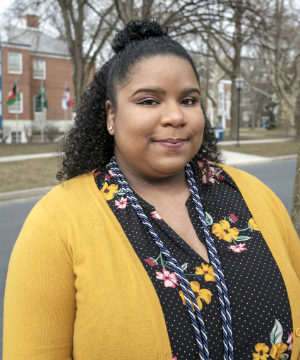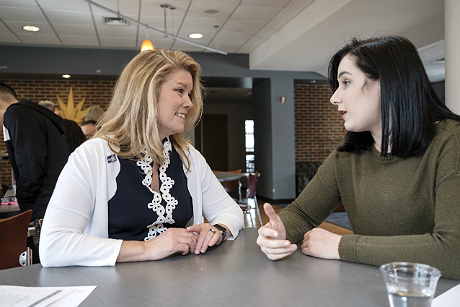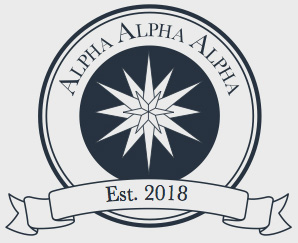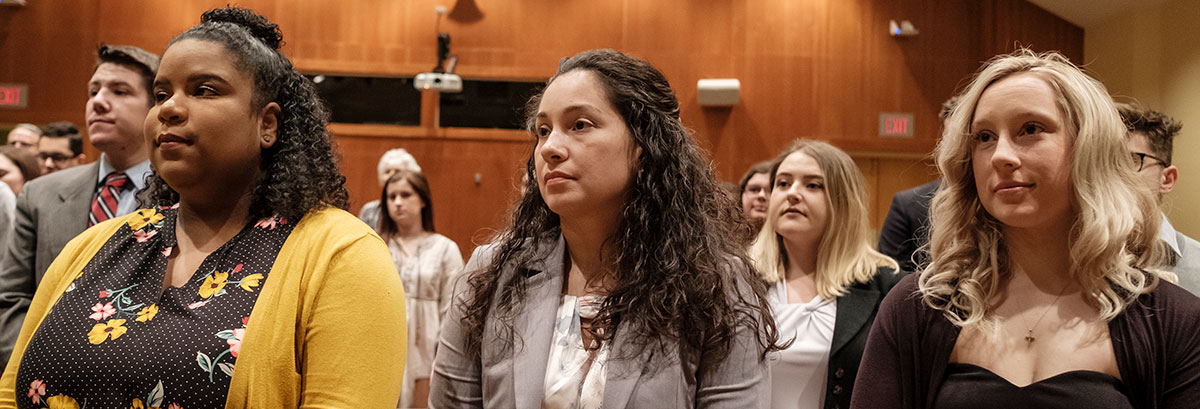The First Generation
Pioneers in the pursuit of education, first-generation students push past the unique challenges they face for the promise of greater understanding and a better life.
By Claire Kowalchik
Photographs by Theo Anderson
Inscribed on the Moravian College seal is the Latin phrase via lucis, “way of light.” John Amos Comenius, whose principles of education form the foundation of our institution, believed that good education is the way of light. “It helps us see the world but also provides guidance for how we can make the world a better place,” explains Craig Atwood, director of the Center for Moravian Studies.
Every fall, we cheer all students who have come to Moravian College to continue their education, and every spring, we celebrate those who have earned their degrees and are ready to step out into the world. On Sunday, March 24, 2019, we honored a special group of students: those who are the first in their families to attend college. At its second annual induction ceremony, Alpha Alpha Alpha—the national honor society for first-generation students—welcomed 48 students, 5 alumni, and 1 honoree, Lea Grigsby, Moravian College’s first lady.
Pursuing higher education demands courage and academic excellence, and earning a college degree is a spectacular accomplishment. This is especially true for the young men and women who break with the generations that have come before them to attend college—the first to follow the “way of light.”
A Challenging Path
First-generation students are the pioneers of their families, blazing trails through unknown territory. Unable to turn to family for guidance, they must rely on their own resources to prepare for college, research the opportunities available to them, and complete applications and financial aid forms.
Once they reach campus, they step deeper into unfamiliar surroundings. “What is a bursar? A registrar? A syllabus? First-generation students haven’t grown up in families where people talk about college,” says Carol Traupman-Carr ’86, vice provost of Moravian College, who was a first-gen student herself. “They face a hidden curriculum of college.” Surrounded by peers who understand the college environment and its ways, first-gens are strangers in a strange land. They may feel self-conscious and reluctant at first. “Often they hide that they are first-generation,” says Traupman-Carr.
They lack cultural capital and may also lack financial capital. “First-generation students are more likely to come from economically disadvantaged families,” points out Traupman-Carr. “We know that on average, people who graduate from college make $1 million more over their lifetimes than those who did not earn higher degrees, so first-gen students often come from lower-income households.”
“What is a bursar? A registrar? A syllabus? First-generation students haven’t grown up in families where people talk about college. They face a hidden curriculum of college.”
Perhaps the most difficult step, though, is the first one: the decision to pursue a college education. For students whose parents and older siblings earned bachelor’s degrees or higher, going to college is the clear next step in an educational continuum and movement toward independence. The first-gen student, however, must deviate from a family system that has persisted for generations. Even when there is enthusiastic support from family to pursue higher education, first-gens may grapple with guilt and feelings of loss as they separate from their families to follow a different path.
Still they come. They push into this new territory with so much promise yet so many unknowns, straining against the pull of family obligation and expectation. And they succeed.
A Promise Fulfilled
Mykayla Biechy ’18 grew up in Saylorsburg, Pennsylvania. Her mom passed away when she was 7, and her dad, a well driller and auto body worker, raised her and her older brothers by himself. Her first job was working on a nearby farm. “I wanted to go to college because I didn’t have any skills,” says Biechy, “and I didn’t want to become a farmer.” A good student, Biechy enjoyed school and learning, and with the support of her father, she came to Moravian. Today, she is an advisor in Moravian College’s financial aid office and is pursuing an MBA.
“For many first-generation students, this is truly an unprecedented journey that has the potential to change their lives and the quality of life for their families,” says Traupman-Carr. To recognize this journey and those who take it, Traupman-Carr conceived of and led the founding of Alpha Alpha Alpha. On March 24, 2018, Moravian inducted the honor society’s first 105 members. As of this writing, 17 chapters have been formed at colleges and universities in Illinois, Louisiana, Minnesota, New York, North Carolina, Ohio, Pennsylvania, South Carolina, and Virginia.
“Moravian offered me so many opportunities and opened up so many doors. My experience here showed me how much I can grow and that my future will not be contained. I can do anything I want if I set my mind to it.”
While the award focuses on students from sophomore through graduate years, faculty, staff, alumni, and an honorary member are also invited to join. “By inducting faculty and staff, we provide a mentoring network for first-gens,” explains Traupman-Carr.
Biechy was a member of Tri-Alpha’s first class. “Getting a college education has meant the world to me,” she says. “Moravian offered me so many opportunities and opened up so many doors. My experience here showed me how much I can grow and that my future will not be contained. I can do anything I want if I set my mind to it.”
Via lucis.
Great Expectations

Diomarys Nunez ’18
Diomarys Nunez ’18 is the second of five children and the eldest daughter born to a woman who emigrated from the Dominican Republic. In a traditional Dominican household, the eldest daughter is the eldest child—expected to take on the responsibilities of the household: cook, clean, and care for the younger children. “My big brother is 2 years older than I am, and when he turned 18, he moved out of the house to pursue his dream of working in the music industry. Because he was a boy, he had more freedom,” explains Nunez.
Nunez grew up in Allentown, living with her mom and siblings and running the household while her mom worked a warehouse job. She went to William Allen High School, where she absorbed messages that suggested she was not college material, but Nunez liked school, and both her mom and dad emphasized the importance of education. “Even knowing that I was needed at home, they said we’d figure out a way for me to go to college no matter how hard things got financially,” says Nunez. “They saw it as a ticket out of our living situation.”
So Nunez started at Lehigh Carbon Community College while taking care of the family, sharing school drop-off and pickup of her younger siblings with her mom, and working nights at a FedEx warehouse. A friend told Nunez about Moravian College, and after meeting with Erika Mondok, director of transfer admissions, who explained that the Moravian experience would be more than just book learning and that lifelong friendships were to be found, Nunez decided to transfer.
The decision put Nunez in an environment rich in academic and social opportunity but also a place of personal angst. “The transition from living at home to living on campus was difficult,” says Nunez, “from helping out with household responsibilities to focusing solely on academics, grades, and career—I definitely felt a lot of guilt coming here.”
Repeatedly, Nunez would struggle with the ingrained expectations of her Dominican heritage weighing against those she set for herself to better her life through a college education. “Sure, I have this final coming up, but should I be going home to help?” she offers as an example.
“I hear my younger siblings begin sentences with ‘when I go to college …’ It won’t be easy, but they understand that it’s worth it.”
Her mother was very supportive of Nunez’s Moravian College education, but not having gone to college herself, she didn’t understand that the experience involved activity outside the classroom. “I had to teach her that it’s more than passing the tests,” says Nunez. “It’s also about job shadowing, internships, networking, and self-care.” Nunez tells about attending Thursday “Dinner, Dessert, and Discussion with Jennika” [Moravian’s chaplain] at the Religious Life House. “If my mom would call during that event, she would ask why I was having dinner there and not at home,” Nunez says. “I explained to her that it was important for me to engage with people at school.”
And it is the relationships that Nunez built here at Moravian that supported her through the tug-of-war between home and college obligations. “Making sure I did what was needed—it was work that I had to do myself, but I also needed to surround myself with the right people. Faculty and staff were there for support, but they played a big role in pushing me to where I could see things for myself,” Nunez says. “During the hardest times, when I felt I needed to be home helping my mom with whatever she was going through, staying the course with my education was definitely a decision I had to make, but I couldn’t have made it alone. Dean Lloyd, Jennika, and my professors, Dr. Brill and Dr. Santiago, reinforced that I was on the right track. ‘Focus on you,’ they would counsel. ‘College is about you learning to become who you are. Your family will understand that this benefits you.’ That’s the message that I have come to appreciate.”
Nunez earned her psychology degree in December 2017 and walked with her class at the May 2018 Commencement. She was inducted into Alpha Alpha Alpha, the honor society for first-generation students, on March 24, 2019. Today, Nunez is studying for her masters in clinical counseling at the Moravian Theological Seminary and anticipates completing her degree by May 2020. “I knew from a young age that I wanted to work with people, help them get better, whatever that meant,” says Nunez, who has a passion for community health and plans to work in the field for a bit before pursuing a doctorate.
At home, Nunez’s sister, age 14, and youngest brother, 8, hear her engage in constant conversation about how impactful college has been. “I’ve brought my sister to Moravian and showed her things no one ever showed me,” Nunez says. “I hear my younger siblings begin sentences with ‘when I go to college …’ It won’t be easy, but they understand that it’s worth it.”
First Lady, First Generation

Lea Grigsby (left) talks with first-gen student Mia Hodge ’20, who will
complete her BA in three years and hopes to enter Moravian’s MBA program.
Spend a few minutes with Moravian College first lady Lea Grigsby, whose bright, spirited affect is immediately infectious, and it becomes clear that her big, bold energy could never be contained in the tiny town of South Paris, Maine, population 2,000—“on a good day,” she adds.
And it isn’t the least bit surprising that she would go to college, despite having no role model for it in her immediate family, or that she’d be leaving Maine to do so. For Grigsby, the world presents a feast of opportunities, and she gobbles them up.
The daughter of a military family, Grigsby was born at the US Naval base in Guantanamo Bay, Cuba. Her family moved to Norfolk, Virginia, and when Grigsby was 9 ½ , her parents brought them to South Paris, next to her dad’s hometown. “It was a bit traumatizing to go from a big city to a small town,” says Grigsby, who filled her free time with extracurricular activities at school. “The second I could get out of Maine, I was headed to warmer weather.”
Though neither of her parents attended college, they encouraged their daughter to go, believing it would lead to a better future and that she could do whatever she wanted if she tried hard enough. That said, there was never a question in Grigsby’s mind. “I like learning. I am outgoing, and I was motivated to see the world.”
She yearned for Virginia and was accepted at Old Dominion University, where she earned a BS in psychology with concentrations in clinical psychology and industrial/organizational psychology.
“I like learning. I am outgoing, and I was motivated to see the world.”
“I absolutely loved college,” says Grigsby. “I had gone from a town of 2,000 to a university setting of 17,000, and I prospered. I was very engaged with student affairs, Greek life, and residence life. There was not much I didn’t do, even staying through the summers to serve as an orientation counselor or summer sports coordinator.”
After receiving her bachelor’s degree, she went straight into graduate school at Old Dominion, earning an MBA with a concentration in international marketing management. In her first career, she worked in international trade and shipping, serving as director of special projects for the Virginia Port Authority. The authority owned and marketed three marine terminals and one inland port in Virginia and is the second-largest general cargo facility on the east coast, generating in excess of $150 million in annual revenue. “I traveled a lot and met lots of interesting people,” Grigsby says, “And I thoroughly enjoyed gaining exposure to the world through this opportunity.”
Later, Grigsby moved into real estate—high-end residential and commercial. When the market collapsed, she went to Georgetown University for a graduate certificate in personal finance planning and eventually tailored that into real estate investing. “I followed what interested me in my career,” she says.
She also followed her heart, moving to the Lehigh Valley in 2014 to maintain her relationship with President Bryon L. Grigsby ’90. The two married last year. Lea says she is still trying to define her role as Moravian College’s first lady. No doubt it will be interesting and active and bright.

The Story Behind the Logo
The Alpha Alpha Alpha logo will forever reflect the honor society’s Moravian College roots. Designed by Caitlin O’Hanley ’19, it depicts a Moravian star in the center of several circles. The star symbolizes the student—a light in his or her family who also strives to be a beacon, guiding others in their journey toward life-changing education and personal fulfillment. The circles represent the communities that surround the student: the college, the broader community, and the world at large.
FMI (for more information)
To learn more about Alpha Alpha Alpha, visit 1stgenhonors.org.
For more information about first-generation college students, go to firstgenerationfoundation.org.

